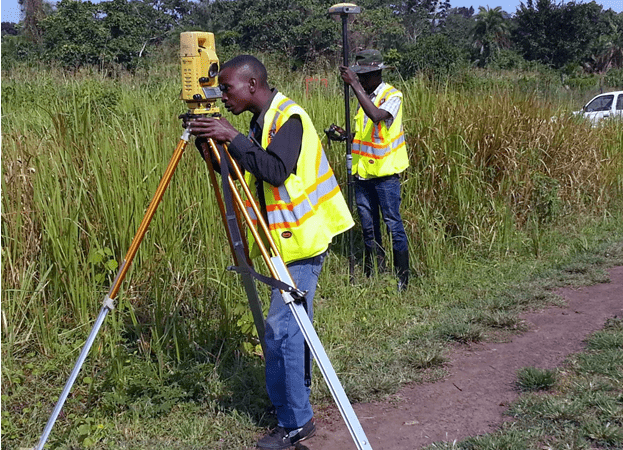CONSTRUCTION & THE BUILT ENVIRONMENT Programs
Bachelor of Technology in Construction & the Built Env Surveying
Overview
Construction and the Built Environment Surveying set of NIT qualification have been designed to address an increasing need for professionally and technically educated individuals to play an integral role in land development, from the planning and design of land subdivisions through to the final construction of roads, utilities and landscaping. Surveyors are the first people on any construction site, measuring and mapping the land. These primary measurements are then used by architects to understand and make the most of the unique landscape when designing and engineers to plan structures accurately and safely, ensuring buildings not only fit with the landscape but are able to be constructed. The term Construction and the Built Environment covers all human-made surroundings that provide the scenery for human activity ranging from offices, houses and parks to supporting infrastructure, like water supply and travel networks. Today’s Construction and the Built Environment should be flexible and adaptable to future uses, resilient enough to cope with climate change, and, most importantly, must enable people to live well.
Surveying is the measurement and mapping of our surrounding environment using mathematics, specialized technology and equipment. Surveyors measure just about anything on the land, in the sky or on the ocean bed. They even measure polar ice-caps.

Who is this qualification for?
Surveying has been a professional for many years. Surveyors are often heavily involved in the planning, development and construction stages of a new project. Surveyors were the first professionals involved in planning and developing the road you travel on, the shopping centers around your work place and home and even your work place and house you live in.
Construction and the Built Environment (Surveying) set of qualifications provides you with various surveying career options to meet several types of surveying careers that are available. The roles of these surveyor, however, often overlap in practice. Different roles in the surveying profession include valuation surveyors, land surveyors, quantity surveyors, and of course, the building surveyors.
Each level of the NIT Construction and the Built Environment (Surveying) will give you an option to join or further develop in the industry as a technical, technologist or professional surveyor specializing in the specific field of your interest. Surveyors operate in the office and in the field. In the field, they use the latest technology such as high order GPS, Robotic Total Stations, and aerial and terrestrial scanners to map an area, making computations and taking photos as evidence. In the office, Surveyors then use sophisticated software, such as Auto-cad to draft plans and map the onsite measurements.
Surveyors work on a diverse variety of projects from land subdivision and mining exploration, to tunnel building and major construction, which means no two days are the same. They are experts in determining land size and measurement. They also give advice and provide information to guide the work of engineers, architects and developers.
The Bachelor of Technology Degree in Construction and the Built Environment Surveying (Level 7) is an ideal qualification for anyone who works in any of the below-listed fields and seeks to develop career-specific skills and progress to higher levels of the program. Graduates may work in any of the following career roles/areas:
- Building Control Surveying Technologist
- Land Surveying Technologist
- Quantity Surveying Technologist
- Building Surveying Technologist
- Design & Build Co-ordinator
- Construction Design Technologist
- Construction Technologist
- Architectural Drafts Technologist
- Architectural Technologist
- Architectural Design Technologist
- Site Engineering Technologist
- Structural Engineering Design Technologist
- Civil Engineering Design Technologist
- Transport Engineering Design Technologist
- Planning and Development Surveying Technologist
- Commercial/Residential Surveying Technologist


What makes this course special?
The National Institute of Technology (NIT) is one of the world’s most successful and best-preferred applied (hands-on) learning brand. The National Institute of Technology qualifications place greater emphasis on self-employment and employer engagement and work readiness.
The NIT-Namibia provides 70% practical and 30% theory teaching and learning methodologies coupled with various practical learning-focused activities that fully engage our students.
The NIT programs in Construction and the Built Environment Surveying are work-related qualifications for students taking their first steps into employment, or for those already in employment and seeking career development opportunities.

Why you must study at NIT?
At National Institute of Technology (NIT), we know how important it is for career ambitious people to get the right education in order to start and further develop their careers.
With today’s industry and employers demanding so much more than just a qualification to contain the effects of global competition and to attain competitive edge, here are the main six (6) reasons why you must choose to study at NIT:
Work Readiness
NIT courses will give you real hands on experience in pursuing your education. It is what is called learning by doing it or action learning. Based on a 70% practical (action learning, action research, projects, reflective thinking, critical thinking, etc.) and 30% theory teaching and learning and assessments methodologies, all the NIT students become work ready (prepared) during their first year of study and graduate with strong work ethics, analytical, problem solving, communication and entrepreneurial skills which are the major factors that employers are looking for in their new recruits.
Employability
NIT’s higher vocational, technical and professional courses prepare students for employment and self-employment. The NIT courses develop a student’s employability skills as they offer the experience of real-life practical tasks and work placements. NIT’s qualifications are generally well-regarded by employers as the courses enable students to develop useful hands-on skills in respective fields of study and in critical areas such as problem solving, time management, entrepreneurial, communication, work behavior, visionary and focus minded, team work, and project planning, execution to evaluation. The knowledge and skills you get from NIT programs will make you be sought after by employers locally and globally. NIT helps students to gain strong knowledge and skills that are essential to start and successfully run their own businesses and/or to be appreciated competent and productive employees that every employer would like to hire.
Relevant
NIT courses are designed and developed with the help of the employers, industrial experts, professional bodies, higher education experts and lecturers. This keeps the NIT curriculum to be industry driven and relevant for today and the future’s job market and self-employment. NIT’s qualifications provide students with industry-specific knowledge, skills and competencies which make graduates’ work outputs to be relevant to their employers’ missions, visions and goals.
Practical Teaching and Assessments
The NIT’s teaching and learning is based on the seven (7) major principles teaching and learning through which theory knowledge is practically applied into various practical teaching and learning methods including action learning, projects supported by verifiable tangible evidences (outcomes), critical reflective thinking, case scenarios, job placements, industrial site visits, public lectures led by industrial experts, etc.
The assessment for NIT courses is largely based on regular coursework and work experience, which makes them an ideal option for those who crumble under the pressure of exams.
All the NIT programs are assessed through objective and rigor-based assignments and projects for which origination is examined through the Turnitin IT Application to ensure that each students submits his/her own true work. The outcome of these assignments must be in an implementable practical and quality standard.
Career and Education Progression
Employers value NIT’s qualifications as the courses are industry-centered and directed. In other words, unlike academic programs, the NIT courses give students the industry-specific knowledge and skills which makes them readily employable. This, combined with the problem solving, time management, entrepreneurial, communication, work behavior, visionary and focus minded, team work, and project planning skills they gained throughout their learning process give the NIT graduates a strong competitive edge to progress in senior job positions and to further pursue their postgraduate professional degrees such as Masters to Professional Doctorate Degree programs at various reputable higher education institutions/universities.
The NIT Certificate in Biomedical Sciences (Level 4) is also designed to reflect the increasing need for progression onto the high quality professional and technical education at levels 5 to 8 and beyond. These qualifications provide students with a clear career pathway so that they can be empowered to effectively and successfully progress and attain their career goals within the fastest period possible.
Reputation and Prestige
- The industry relevance, practicality, career specific and quality of the NIT qualification will make you to standout and visibly be seen and noticed in a cloud of many academically qualified graduates.
- As more employers expect their new employees to have relevant practical skills and competencies than costly academic knowledge, NIT makes your CV and profile standout.
- NIT is known for stringent quality standards which govern the provision of its higher vocational, technical and professional courses. NIT is also known for its practical, relevance and Industry driven courses.
- The above values, compounded with the work ethics, entrepreneurial and problem-solving skills you will learn and practice while studying at NIT will grant you the respect, reputation and prestige within the industry sector you will work.

Qualification Purpose and Outcomes
Upon completion of Bachelor of Technology Degree in Construction and the Built Environment Surveying (Level 7), graduates will be able to:
- Analyse and apply theoretical principles and practical Construction and the Built Environment Surveying procedures and techniques to independently provide Construction and the Built Environment Surveying to community members.
- Apply measurement techniques to produce a bill of quantities.
- Determine property boundaries by providing data relevant to the shape and contour of the earth’s surface for engineering, mapmaking and constructions projects.
- Strategically develop and manage their construction firm in any field of specialization.
- Design, plan, conduct and report investigations and research to solve problems and communicate the results of their study accurately and reliably seek solutions to routine and unfamiliar problems.
- Apply skills for planning, resourcing and managing processes within broad parameters and functions with complete accountability for determining, achieving and evaluating personal and/or group outcomes.
- Progress to Professional (honors) Degree in Construction and the Build Environment Surveying (Level 8).

How will I learn?
The NIT tutors/lecturers are equipped with various traditional teaching methods which are all used to create and develop Vibrant, Skilled, Competent, and Work-prepared Entrepreneurial Technicians, Technologists, and Professionals. The teaching and learning practices involve 70% practical and 30% theory methodologies by applying a wide range of action learning techniques stipulated in the course specification.

What does the course involve?
You will study a combination of theory, applied theory and practical subjects across a broad range of units. To succeed, your effective time management and focus are both very critical. You will cover twelve (12) units. For each unit, you will do a main test, assignments and an examination in addition to an integrated project. These assessments do not include the informal tests, homework and assignments which your lecturers will require you to do in each learning outcome. To pass this applied qualification, it is critical that constantly monitor, formalize yourself with and operate alongside developments taking place within the Education and Training sector by regularly visiting Education and Training organizations, reading news and articles related to the sector, etc.


Assessment Methods
The NIT programs are assessed using a combination of:
- Informal Assessments
- Formal Assessments
Informal assessments are conducted by lecturers on each covered component of the unit outcome to weigh knowledge created into his/her students so that necessary teaching practices adjustments can be made as appropriate.
Formal Assessments are further classified into two parts:
- Formal Continuous Assessments which comprise of:
- Major Test
- An Integrated Project
- Formal Final Assessments which comprise of:
- Major Examination
- Unit Assignments

What are the Career Progression Opportunities?
Learners who have achieved the Bachelor of Technology Degree in Construction and the Built Environment Surveying (Level 7) can progress on to the Professional (Honors) Degree in Construction and the Built Environment Surveying (Level 8). They can also competently serve in any of the below-listed job areas.
What are Articulation Opportunities?
The credit transfers from other programs offered by other institutions or other NIT programs will be dealt with according to NIT rules and regulations on Recognition of Prior Learning. Provided that an applicant has qualification accredited by NQA and verifiable through the NQF, the NIT rules provide for course by course credits as well as credit transfer by volume under certain conditions. Maximum credits that can be granted from none technical (hands-on) programs are 15% of the credits for a qualification. Maximum credits that can be granted from the technical (hands-on) programs of similar standards with those of NIT are 50% of the credits for a qualification.

What career opportunities can this lead to?
The Bachelor of Technology Degree in Construction and the Built Environment (Surveying) (Level 7) is an ideal qualification for anyone who works in any of the below-listed fields and seeks to develop career-specific skills and gain a solid qualification in Construction and the Built Environment (Surveying) in general to support his/her position in order to progress to more senior level. If you are interested in any of the following careers, then this could be the course for you:
- Building Control Surveying Technologist
- Land Surveying Technologist
- Quantity Surveying Technologist
- Building Surveying Technologist
- Design & Build Co-ordinator
- Construction Design Technologist
- Construction Technologist
- Architectural Drafts Technologist
- Architectural Technologist
- Architectural Design Technologist
- Site Engineering Technologist
- Structural Engineering Design Technologist
- Civil Engineering Design Technologist
- Transport Engineering Design Technologist
- Planning and Development Surveying Technologist
- Commercial/Residential Surveying Technologist

What are the Fees?
Our fees include:
- Application/Registration Fees
- Tuition Fees
- Other Fees include Laboratory Fees, Study Manuals, industrial site tours, action research, etc. (where and if applicable).
For more information about our fees, please contact any of our Call Centre at any of our Campuses or the Marketing and Public Relationships Department.

Funding Opportunities
There are many funding options for the NIT’s accredited programs. Most of our students have over the past years been funded by their employers while others finance their studies on their own. Students can also apply for study loans with Namibia Students Financial Assistance Fund. NIT also provides scholarships and bursaries to students who meet requirements as stipulated in our annual prospectus.
Withdrawal/Cancellation
Any cancellations/withdraw or refunds are executed as per the NIT policies. For more details, refer to the Students Registration Agreement and the Withdraw Policy.

The Bachelor of Technology Degree in Construction and the Built Environment (Surveying) (Level 7) is made up of twelve units. It is structured to be studied for one year through Distance Learning, Online, Virtual Campus, Part-Time, Full-Time, Or Blended Learning.
Total Unit/Modules
The following is a compressive list of course units/modules you will cover in this program:
Units for Bachelor of Technology Degree in Construction and the Built Environment (Surveying) (Level 7)


Work placement/experience requirements
Although there are no specific mandatory elements of work placement/experience required for the Bachelor of Technology Degree in Construction and the Built Environment (Surveying) (Level 7), students are expected to apply theories learned through various methods and carry out the practical learning activities as provided in the qualification specification.

Completion of Study Enrolment Form
Download and complete the Student’s Enrolment Agreement (SEA) form or obtain one from our Call Centre at any of our Campuses, print and complete it and submit it with proof of payment for the stipulated registration fees together to any of our Campuses before the stipulated application deadlines to avoid paying late application/registration fees. To be considered for approval, the completed enrolment agreement form must be accompanied by certified copies of documents as stipulated on the Student’s Enrolment Agreement (SEA) form.
Applicant must ensure that:
- The enrolment agreement form is properly and fully completed and that each page is initialed and signed;
- He/she provides all the required documentation such as certified copies of qualifications, Identity Card/Passport photos, Supporting letters from employers,
- He/she deposit registration fees into the respective Campus’ Bank Account provided on the enrolment agreement form and submits the original copy of the deposit as proof before being issued with an official receipt.
- He/she is issued with an official Institutional Receipt, stamped with Official Company Stamp, and Signed by the Head of Call Centre for every payment made to the NIT.
- Please note that NIT does not receive cash payments,
- He/she obtains a written acknowledge letter confirming that his/her completed enrolment agreement form has been received.
- He/she obtains the status of his/her application for studies within 30 working days.
- If admitted, an Admission letter issued by the Admissions section in the Office of the Registrar is obtained through the respective campus together with the timetable, program specifications, syllabuses, student’s details of student’s portal, student’s handbook, and rules and regulations, student card, and any other information.
When can I apply?
NIT has a whole year circle of accepting new applications from students from all over the world. However, please take note that applications for the First Semester which starts in January/February each year are only considered up to March of each year. This period includes late registration. Unsuccessful applications for First Semester and applications that are received late are considered for the Second Semester which starts in July each year.
The following are two (2) annual teaching and learning intakes for students to register to study on this program at NIT:
- January/February – June
- June/July – November
Applications must be made in-time to avoid late registration fees and to be disappointed if spaces are allocated to earlier applicants.
Apply Online now!!!

What must I have to qualify?
The entry to this qualification shall be based on:
The applicant must meet the NIT’s minimum the General Admission Requirements of NIT. Specifically, applicants must have passed 80% or all the courses (Units) work for Diploma in Construction and the Built Environment (Surveying) (Level 6).
Qualifications obtained from other higher education institutions will be considered for entry to this program on subject to subject similarity and comparability basis and in terms of the NIT regulations.
Apply Online now!!!

Resources for Prospecting Students
- Qualifications Brochure
- Prospectus
- Online Application
- Application Form
Resources for Registered Students
- Students Handbook
- Institutional Calendar
- Learning and Assessments Policies
- Qualifications Specifications
- Assessments Schedules
- Recorded Lessons’ Presentations
- Virtual Classrooms
- Virtual Library
- Virtual Laboratories
- Study Manuals and Books

